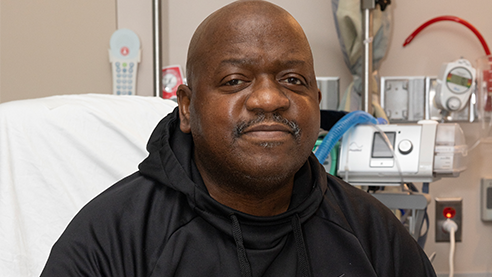1st person to receive a pig kidney transplant has died

The first person to receive a pig kidney transplant has died just two months after he underwent the groundbreaking procedure.
Rick Slayman, a 62-year-old from Weymouth, Massachusetts, had a genetically modified pig kidney placed in his body as part of a four-hour, pioneering surgery at Massachusetts General Hospital on March 16.
Slayman had end-stage kidney disease and had previously received a human kidney transplant, which showed signs of failure after a few years. His doctors proposed the experimental pig kidney transplant as Slayman was restarting dialysis and experiencing severe complications.
The doctors hoped that the pig kidney could last years, CNN reported, but, as such a transplant hasn't been done before, there was uncertainty about how well it would take. Slayman died just weeks after his surgery, but his medical team says there's no evidence the transplant was related to Slayman's death.
Related: 1st partial-heart transplant growing with baby 1 year later
"The Mass General transplant team is deeply saddened at the sudden passing of Mr. Rick Slayman," the hospital shared in a statement on Saturday (May 11). "We have no indication that it was the result of his recent transplant." The statement did not detail Slayman's cause of death.
As of March 2024, more than 100,000 Americans are on the waiting list for organ transplants, 89,000 of which require a kidney. Each day, 17 people on these lists die. Transplanting genetically modified organs from animals into humans, a process known as xenotransplantation, is seen as a promising new way to potentially address the shortage of available organs from human donors.
Before Slayman's procedure, scientists had only conducted experimental pig kidney transplants in brain-dead organ donors, as a proof-of-concept for the surgeries. However, since then, another living patient has since received one — a 54-year-old who also received a heart pump along with the pig kidney.
The first person to receive a pig organ of any kind was a Maryland man who underwent the world's first pig-heart transplant in 2022. He died shortly after the surgery, likely as a result of being infected with a pig virus that triggered an inflammatory response.
In Slayman's case, scientists used CRISPR gene-editing technology to modify the genes of the donor pig, removing ones that could prompt the human immune system to attack the kidney and adding ones that could help prevent transplant rejection. The patient also simultaneously received antibody-based treatments and immune-suppressing drugs to help prevent organ rejection.
The kidney itself came from a company called eGenesis, which previously successfully tested the transplant in monkeys. On average, the monkeys lived for around 176 days, or nearly six months, after surgery in these experiments.
In the hospital's statement, Slayman's family said they were thankful to spend his last few weeks with him.
RELATED STORIES
—1st-of-its-kind therapy blocks immune attack after stem-cell transplant
—Doctors perform 1st-ever whole eye, partial face transplant
—Breast implants saved a man's life during a lung transplant. Here's how.
"[The medical team's] enormous efforts leading the xenotransplant gave our family seven more weeks with Rick, and our memories made during that time will remain in our minds and hearts," they wrote.
"Millions of people worldwide have come to know Rick's story," they added. "We felt — and still feel — comforted by the optimism he provided patients desperately waiting for a transplant."
Ever wonder why some people build muscle more easily than others or why freckles come out in the sun? Send us your questions about how the human body works to community@livescience.com with the subject line "Health Desk Q," and you may see your question answered on the website!
